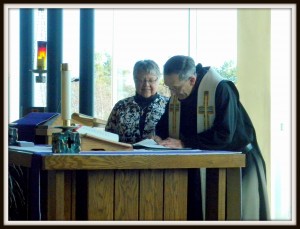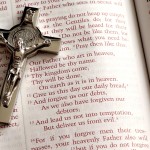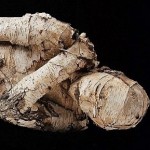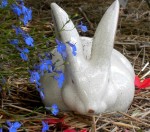My final oblation was at hand. That night at vespers I would lay my heart and all my will upon the altar. My joy was boundless and barely kept in check. I cried as I prayed lauds, overwhelmed with love. I wanted desperately to commit “for the rest of my life” to service of God and neighbor.
Three hours before vespers Fr. John heard my confession. I know myself well—when anxious I fall mute—and had spent time writing out my sins. There is a powerful movement of the soul when the hand adds weight with leaded lines to the elusive sense of sin. I wanted the lines erased so I could stand in grace when professed.
We headed across the chapel to the sacristy to bless my cross. While Father retrieved the holy water and prayer card from the cabinet he asked what I felt about the upcoming ceremony. I gushed and flushed red with excitement.
It was like a wedding, I told him, but without the anxiety. I would be making a promise to God, a vow that He would always be first: my first thought in the morning, the last as I curled up to sleep, with me when awake in the night or moving through my day. Fr. John is accustomed to my radiant exuberant joy, and smiled at my delight in a monkish sort of way.
Another novice, Michael, would also be making his final oblate profession that night. We were given our sheets that the Prior would read, and on which were highlighted the words we were to answer. I laughed at Fr. John’s impish comments of weddings, and was quickly shushed by the Prior. I have an infectious laugh that had obviously infected the monastic silence.
Vespers were spoken and I noted the cadence and tone of men. Their voices resonated and softened an old hardened scar on my heart. It was the will of God that drew me to the monks. According to The Rule of St. Benedict, it is though these men only would I grow in holiness. A terrifying and comforting thought in one.
Michael and I were called to the sanctuary where the promises were asked, and our promises given. As I approached the altar to sign my Formula of Oblation I wasn’t sure if I would cry with joy, tremble so hard that I couldn’t sign my name, or faint outright in glory. I placed my hand on that holy table and calmed—the moment had arrived.
Signing my name at the altar changed my life, but not as in the earth-moved-under-my-feet. It had the sense of “I was that, and now I am this.” I imagined it to be much the same as a parent when a child is born. Or the way one feels after the marriage vows. The expressed reality of “I am no longer allowed willing to be as I was.” The time comes with a child or marriage for a decrease in self for the good of another.
In the eagerness to be all as offered in my oblate promise, there existed a counter intuitiveness of becoming more of who I am in God and less of who I was as only me.
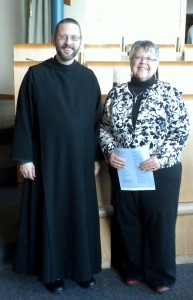
Margaret Rose Hildegard Realy, Obl. OSB
I find the glistening of limerence still sparkles in the glow of the honeymoon. When all is seen in The Light and lightness carries the day. This is the time before the real work of the spoken promises–when the I do’s and I will’s with the help of God’s grace–haven’t yet begun.
Soon enough the work of the day will come. That after the ecstasy the meals will need making and the dishes done. For a little while longer I will rest in the quiet comfort of the honeymoon. I cherish the glow.
UPDATE: I just learned a small but significant detail about signing the Formula of Oblation on the altar. Prior Michael (above, at the altar) stepped several steps away once I touched the altar and he did not come forward until I had finished, and stepped away. He did that because the novice him/herself must lay the document on the altar and sign it without the abbot as intermediary. The oblate or monk is therefor the servant of God first and the subject of the abbot second.
Images Margaret Rose Realy, Ob;. OSB. All rights reserved.

